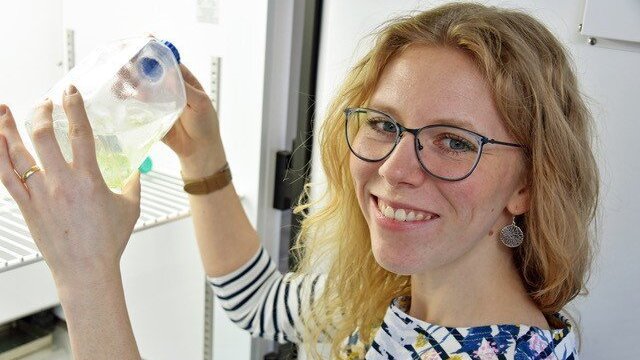
Junprof. Dr. Julie A. Z. Zedler
»Cyanobacteria are fascinating organisms that deserve more attention in the public eye. I am hoping to play a role in showcasing their full potential.«
Academic Career
2012 · First Degree
Universität Konstanz
2016 · Doctoral Studies
University of Kent, Canterbury, UK
2019 · Juniorprofessorship
Friedrich-Schiller-Universität Jena
Interview
What do you like about your work as a researcher? Why did you decide to become a researcher?
My job is very diverse and no day is the same - everyday brings new surprises. Working as a researcher in academia gives me a lot of freedom to explore and to follow my scientific curiosity which was an essential criterion in my career choice. I learn new things on a daily basis and at the same time I can pass on knowledge when supervising and teaching students. I find it very rewarding to see my students achieve things and grow.
Who were/are the role models who influenced your career choice?
My great grandmother has a PhD in photosynthesis that she completed in the 1920s - although I never met her, she has always been an inspiration to me. She could not move ahead with her career at the time and I partly feel that advancing my career is also on her behalf.
Who or what gave you the most encouragement along your way to achieving your current position? Whose support, or what support, was most important for you?
This is clearly my husband. He never hesitated to fully support my career decisions and follow me to new places without questions asked. Balancing two scientific careers is very demanding and requires a lot of sacrifice and effort that he was always willing to take and put my career first. I have also had great mentors along my way that were always supportive and encouraged me in all my endeavours.
Has your career progressed smoothly in a linear way? If not, how have you overcome distractions of obstacles?
On paper, I would say that my career looks very tidy. So far, I was lucky to smoothly move from one stop to the next. This did, however, come with many compromises, especially in my private life, that were not always easy. Looking back, I think it is important to give yourself enough space to breathe and accept that careers paths are diverse and do not have to necessarily progress in a linear way.
An academic career often seems to be one of great uncertainty. Has this been the case for you?
Unfortunately uncertainty is still too prevalent in academic careers. I have been lucky to have secured a tenure-track position at a relatively early stage in my career. This puts me in a more assured position with a permanent position in reach, but the uncertainty is still there. I try to deal with things as I go along and not think too much ahead. This might not work for everyone, but, for me, it is an important strategy to avoid getting overwhelmed.
How important is networking to your career? Do you have a particular strategy for networking?
Networking has been, and always will be, important for my career and my science. Most importantly, it opens up so many opportunities that one can't miss. Personally, networking allowed me to meet people I wanted to (and ended up) working for. Networking has also served as a starting point for fruitful collaborations that elevate my research output. I do not have a particular strategy for networking. Generally, I try to stay true to myself and identify opportunities when they come along. I think it is important not to force it too much - the more often you do it, the more likely a good opportunity will come along.
How do you manage to balance a demanding career with a private life?
As a young academic it is a challenge to achieve a healthy work-life-balance. The way the academic system is currently set up also does not help. At this point of my career a lot is on the cards and I try to do everything I can. It is important for me to feel like I have done my best. My husband is an essential element of my private life helping me to cope and sometimes re-think my priorities in the interest of my health.
What tips would you offer young women starting out on an academic career? Could you offer some Dos and Don’ts?
An absolute »do« for me is international experience - this helped me to look at things from different perspectives and grow as a person. In regard to »don’ts«, positive discrimination policies are helping to increase diversity and equality, but this also comes with problems. Too often there is the opinion that young women are hired for representation rather than for merit. So it is important for young women to not give too much weight on the specific reasons of the hiring process and move forward with confidence. Ultimately, an academic career is a big commitment, and, in the end, one has to make this decision based on the personal circumstances and visions.
Do female academics of the University of Jena feel comfortable in their roles? What makes the University of Jena attractive for you?
I can only speak for Biology and associated subjects: in this area excellent science is conducted here at the university while at the same time the community is still of a manageable size with encouragement to collaborate among colleagues and also within the local research hub - this makes it an attractive place to establish a career.